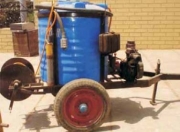/topics/sustainability
Sustainability
National Rural Livelihoods Mission – Framework for implementation by Ministry of Rural Development
Posted on 16 Dec, 2010 07:46 PMThis document prepared by the Ministry of Rural Development (MoRD) presents the framework for implementation of National Rural Livelihoods Mission. The key challenge, in India is to ensure that the economic growth is inclusive and leads to significant reduction of rural poverty.
Drought 2009: Overview and management – A report by the Ministry of Agriculture
Posted on 16 Dec, 2010 09:39 AMThis document on the management of drought during 2009 published by the Department of Agriculture and Cooperation of the Ministry of Agriculture presents the deficiency and erratic behavior of rainfall, impact of drought, mitigation efforts initiated and their results. During the deficient and erratic rainfall of South-West monsoon 2009, fourteen States declared drought/ drought like situation/ scarcity in 338 districts of the country.
Immediate moratorium sought on clearances for large dams in northeast India - Press release by Krishak Mukti Sangram Samiti (Assam)
Posted on 14 Dec, 2010 10:56 PM23rd November 2010, New Delhi
- Seeking a moratorium on clearances for large dams in Northeast India
- Withdrawal of clearances granted to 2000 MW Lower Subansiri, 1750 MW Demwe Lower & 1500 MW Tipaimukh dams
- Future steps on hydropower projects and dams only after full, prior and informed consent of people in the region
- Protect the Brahmaputra river basin as a cultural and ecological endowment
Unregulated sand mining threatens Indian rivers - Ground report article
Posted on 11 Dec, 2010 03:47 PMArticle and Image Courtesy: Ground Report
Many in India, perhaps, are not able to foresee how lack of governance, virtually, in every sphere is going to hit them in not too distant future. Take for instance mining. Illegal mining of mineral resources, with generous help of political and bureaucratic big wigs, is so rampant that not only are the country’s precious natural resources being purloined in a big way, its forests are being clean-felled, land degraded and its rivers threatened with extinction.
Water conservation - A viable option to improve water availability - Solution Exchange paper
Posted on 11 Dec, 2010 12:16 PMThis paper from the recommended documentation section of the Solution Exchange for the Water Community Discussion Summary on the preparation of the strategic plan for rural drinking water by the Department of Drinking Water Supply, Ministry of Rural Development, is directed at stakeholders, planners, managers and consumers.
The paper argues on the importance of water conservation in the context of the increasing water shortages that the country has been facing in recent years because of expansion of irrigated areas and rapid industrialisation.
The article argues that water conservation practices need to be encouraged and improved through research, effective regulations, information dissemination and incentives to the end user and more emphasis needs to be placed on adequate coverage, quality monitoring and collection of field level data.
Approach paper on water quality issues in islands – Andaman & Nicobar and Lakshadweep by Central Ground Water Board
Posted on 10 Dec, 2010 09:18 PMThis approach paper by the CGWB on water quality issues in islands (Andaman & Nicobar and Lakshadweep) includes a detailed and comprehensive account of the basic information pertaining to each group of islands separately such as administrative set-up, population, climate and also the technical aspects like geomorphology, geological and hydrogeological conditions.
Farm Innovators – A compilation by the Indian Council of Agricultural Research (2010)
Posted on 09 Dec, 2010 09:23 PM This publication by ICAR on “Farm Innovators-2010” brings in a paradigm shift towards participatory technology development. Apart from innovations and scientific package of practices developed and transferred from R&D institutes, innovations in the form of grassroot level technologies and methodologies developed by some of the innovative farmers and rural youth have also been accepted across the system.
This publication by ICAR on “Farm Innovators-2010” brings in a paradigm shift towards participatory technology development. Apart from innovations and scientific package of practices developed and transferred from R&D institutes, innovations in the form of grassroot level technologies and methodologies developed by some of the innovative farmers and rural youth have also been accepted across the system.
India - Water resources management sector review - World Bank (1998)
Posted on 08 Dec, 2010 05:20 PMThis background report on Rural Water Supply and Sanitation by the World Bank, as a part of the Water Resources Management sector review, dwells on the policy and constraints of this sector, institutional and financial issues related to sector reform process and advocates an approach/plan to bring about radical reforms in the sector.
Workshop on “Integrated Domestic Water Management”, Development Alternatives, New Delhi
Posted on 07 Dec, 2010 05:39 PM Organizer: Development Alternatives (DA)
Organizer: Development Alternatives (DA)
Water security for India: The external dynamics - An IDSA Task Force Report
Posted on 01 Dec, 2010 08:44 PMThe report by Institute for Defence Studies and Analyses is premised on the fact that India is facing a serious water resource problem and is expected to become 'water stressed' by 2025 and 'water scarce' by 2050. It raises fundamental questions about the forces driving water demand and the political dynamics of riparian relations, both in terms of hindrances and opportunities, amongst states in the subcontinent. Rivers, a crucial source of water resources, physically link upstream and downstream users and at the same time create barriers.




